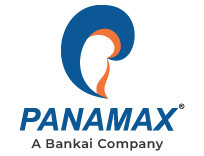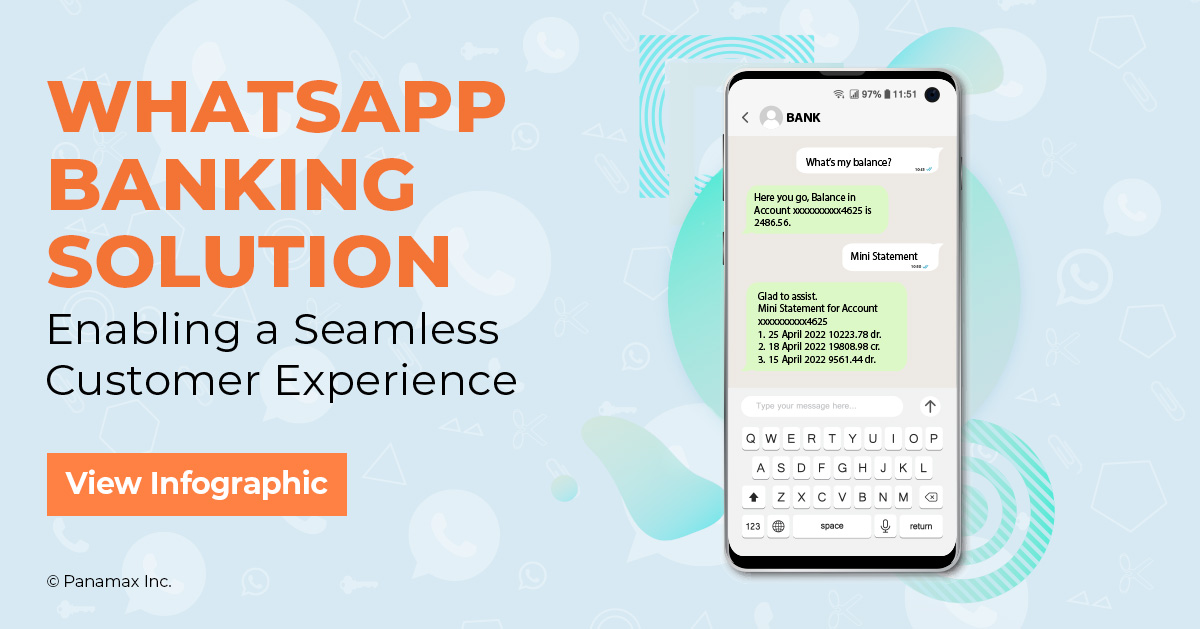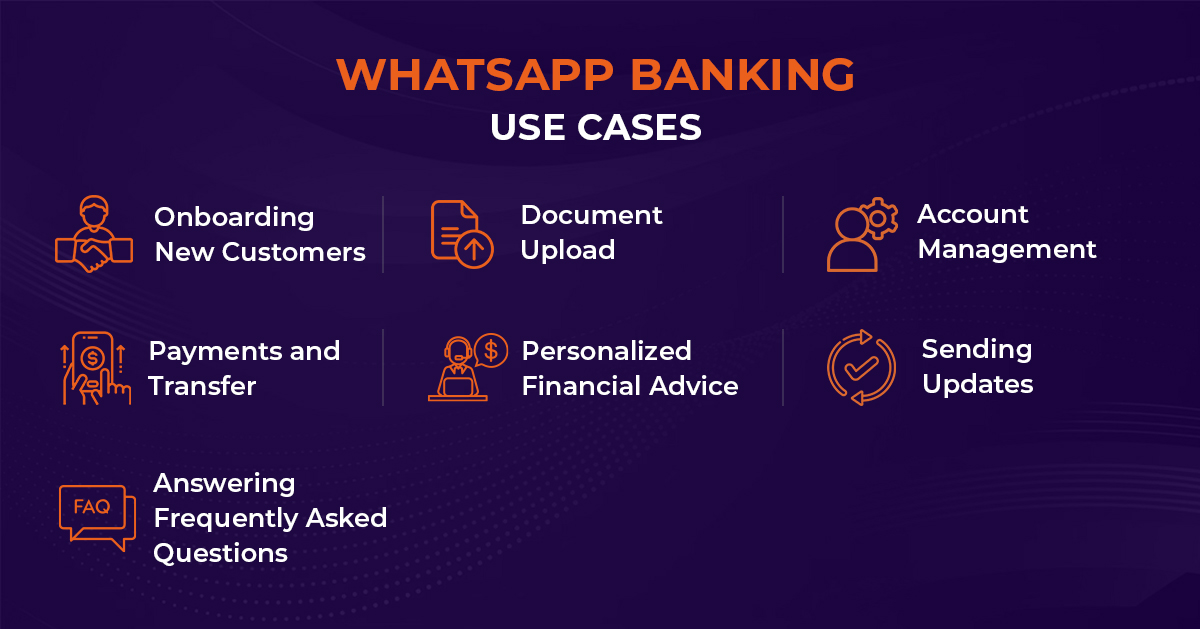Digital banking has changed the banking landscape, opening several opportunities to expand its customer base, reach, and operations into new markets. One of the most recent trends has been leveraging the popular messaging service WhatsApp. It has presented an opportunity for banks to leverage and improve the customer experience, which could have ripple effects on profitability and brand reputation. But there's a question: how can banks harness this new opportunity safely and effectively?
What is WhatsApp Banking
WhatsApp Banking is a popular messaging application (that is a combination of a banking chatbot and WhatsApp business APIs) for conducting banking activities and accessing financial services. It involves integrating banking systems with the WhatsApp platform, allowing customers to interact with the bank's systems, perform various banking tasks and receive updates or notifications through the app.
With WhatsApp banking, users can interact with their banks and access certain banking features and services offered without visiting the branch or using a separate banking application.
As WhatsApp banking is growing, a report by Sopra Banking Software highlights that WhatsApp banking is growing, with clients of Brazilian bank Banco Bradesco using WhatsApp to consult the bank's AI-powered chatbot 88.5 million times in 2021, a 16-fold increase in interactions compared to the previous year.
Features of WhatsApp Banking
Account Balance Inquiry
Users can check their account balances by sending a specific command or query. It allows quick and convenient access to account information.
Transaction Alerts
Banks can send automated notifications to customers regarding their account activities, such as transaction alerts, deposit confirmations, or balance updates. These alerts update real-time transaction status and help users track their financial activities.
Fund Transfers
Users can transfer funds between their accounts or to other beneficiaries by providing the necessary details. It allows for quick and seamless fund transfers without the need for additional banking apps or platforms.
Bill Payments
It enables you to make payments for utility bills, credit card bills, or other bills through the app by following the instructions provided by the bank.
Account Statements
Users can request and receive account statements for a specific period directly on WhatsApp. Also, you can receive monthly or periodic bank statements on WhatsApp, providing them with a consolidated view of their transaction history.
Customer Support
It provides a channel or platform for customers to contact their banks for inquiries, complaints, or support-related issues. Also, WhatsApp banking APIs could enable users to interact with customer support representatives, address inquiries, or resolve issues through chat or voice/video calls.
Product Information and Offers
Banks can send product information, promotional offers, and personalized recommendations for users to stay updated on new banking products, investment options, and special deals.
Language Support
Many WhatsApp banking services provide multilingual support, allowing users to interact with the bank in their preferred language. This feature helps to enhance accessibility and improve customer experience.
To access WhatsApp banking, customers need to register their mobile numbers with their respective banks for using WhatsApp as a banking channel. The banks provide specific phone numbers that customers can save in their contacts to initiate conversations with the banking system.
What Benefits do Customers and Businesses have Through WhatsApp Banking?
WhatsApp banking offers users several benefits, contributing to a convenient and accessible banking experience. Here are some key advantages:
Accessibility
It allows users to access banking services directly through the widely used messaging platform, accessible to many people with internet connectivity. It eliminates the need for physical branch visits or a separate banking app.
Convenience
Users can perform various banking tasks and access services anytime and anywhere with an Internet connection. It enables quick and easy transactions, account inquiries, and customer support, eliminating the need to wait in queues or make phone calls.
Transactional Efficiency
Users can perform various banking transactions through WhatsApp, including funds transfers, bill payments, and mobile recharge. These transactions can be completed quickly and securely within the messaging platform, saving time and effort.
Real-Time Alerts and Updates
WhatsApp banking allows banks to send customers real-time notifications, alerts, and updates. This feature informs customers about their account activities, such as transaction confirmations, balance updates, and due date reminders.
Personalized Customer Service
Banks can provide personalized customer support for users to communicate directly with bank representatives via chat, allowing for quick query resolutions, assistance with banking products, and guidance on financial matters.
Secure Communication
WhatsApp implements end-to-end encryption, ensuring that messages between users and banks are secure and private. This encryption helps protect sensitive banking information and enhances the overall security of transactions.
Cost-Effective
It offers cost savings for both banks and customers. Banks can reduce overhead costs associated with physical branches, while customers can save on travel expenses and avoid potential fees charged for certain banking services.
To understand more about WhatsApp Banking Solutions and how it benefits customers, look at WhatsApp Banking Solution: Enabling a Seamless Customer Experience Infographic
The potential of WhatsApp banking is to improve customer experience and reduce costs for banks. However, it's important for banks to ensure that they are using the platform safely and effectively and that they are complying with relevant regulations and data privacy laws.
Why Businesses opt for WhatsApp Banking Software Solution
Businesses nowadays opt for WhatsApp banking solutions for several reasons, as banks simplify daily operations like balance summaries, history, money transfers, and payments.
Security
With WhatsApp banking APIs, businesses can send, receive, and securely store information. WhatsApp uses end-to-end encryption to ensure that only the bank and the customer can access the information.
In addition, banks can install security protocols directly into their apps, allowing them to authenticate customers after they've logged in. Authentication is done with a password, phone token, biometric password, or a combination of all three. It is essential as regulatory requirements like Strong Customer Authentication (SCA) take hold globally.
Improves the Overall Costs
Most banking services have embraced the concept of open API development, which is considered a lifesaver. Integrating them with various applications lets you keep track of every crucial piece of information and makes it easy to deal with the bank's website.
Enhance Customer Experience
Banks are waking up to the fact that customers expect the same seamless, convenient service as they get from tech companies like Amazon, Netflix, Uber, and many others. They expect high-quality customer service and personalized care — especially when their money is at stake. They want fast and customized service and even more so, they want a reasonable price.
The first and arguably most crucial step in banking transformation is to improve customer experience. It's never been clearer that customers’ attention is now a key driver of growth. Retail banks regularly practice customer experience optimization and grow more than three times faster than competitors.
The banking industry is set to revolutionize how customers access their accounts and make banking more convenient. WhatsApp banking solutions help banks meet growing expectations in multiple ways. It can offer the immediate and personalized service its customers want through automation, better data, and integrations.
Increases Efficiency
Customer support is a core priority. By working with a WhatsApp banking API, teams can dramatically increase efficiency by automating frequently asked questions and resolving customer queries faster than any other channel.
Conversational banking plays a vital role in resolving queries in less than 2 minutes, which is known to be the maximum amount of time a customer is willing to wait to have an issue resolved. It also decreases calls to contact centers by 50%, allowing you to free human resources.
Faster Innovation
The WhatsApp Business API makes it easier for financial institutions to innovate and stay ahead of the competition. Instead of building new products and services from scratch, banks can partner with third-party developers to create solutions that benefit customers. It means that instead of going head-to-head against fintech companies (including companies like Apple and Google), they can adopt new ways to offer services.
WhatsApp banking software solutions offer a range of benefits for businesses, including improved customer experience, cost savings, increased efficiency, expanded reach, and competitive advantage. To understand more about whatsApp banking let’s understand WhatsApp banking APIs, its features and how it works.
What are WhatsApp Banking APIs?
WhatsApp banking APIs (Application Programming Interfaces) refer to the set of tools and protocols that allow banks and financial institutions to integrate their banking systems with the WhatsApp platform. It is an interface between internal bank tools and customers. These interfaces enable banks to build customized applications or services that can interact with WhatsApp and provide banking functionalities to their customers. It helps to scale customer communication on WhatsApp to bring new services and products to the market.
WhatsApp provides a Business API that allows authorized businesses, including banks, to connect their systems with WhatsApp. This API enables the integration of WhatsApp's messaging capabilities into the banks' infrastructure and banking applications. It provides a secure and controlled way for banks to send and receive messages and notifications and perform banking operations through WhatsApp.
WhatsApp banking APIs connect banks to their customers through an infrastructure that gives them the flexibility they need to use. It also connects customers, vendors, and processes to make conversations more meaningful.
Banks can automate processes and make 1:1s more engaging using the WhatsApp Business API. It allows customer service teams to interact in real-time with customers and ask questions that get answered at the right moment – increasing the number of "one-on-ones" each customer receives.
WhatsApp Banking APIs offer Several Features and Functionalities, Including:
Message Sending and Receiving
WhatsApp messaging platforms allow banks to send messages to their customers, such as transaction alerts, balance updates, or customer support messages. They also facilitate the reception of customer messages, enabling two-way communication.
Template Messaging
APIs support using pre-approved templates for sending standardized messages to customers, ensuring compliance with WhatsApp's policies and guidelines.
Media Sharing
APIs enable the transmission of images, documents, or media files to customers via WhatsApp, allowing banks to share account statements, forms, or other relevant documents.
Session Management
APIs provide mechanisms for managing sessions and maintaining customer conversations over an extended period, ensuring a seamless banking experience.
Security and Authentication
APIs incorporate security measures such as encryption and authentication protocols to protect customer data and ensure secure communication between the bank's systems and WhatsApp.
Notification Hooks
APIs allow banks to receive real-time notifications from WhatsApp regarding customer interactions, message deliveries, or other events, facilitating automation and integration with their banking systems.
WhatsApp Banking APIs allow businesses to interact with their customers on the digital platform. It can be utilized by banks to provide various services, including customer support, notifications, transactional messages, and more.
How do WhatsApp APIs for Banking Work
WhatsApp APIs enable banks and financial institutions to integrate the WhatsApp messaging platform into their existing banking systems and applications. These APIs allow banks to offer banking services and engage with customers through WhatsApp. Here's a general overview of how WhatsApp APIs for banking work:
Registration and Approval
Banks must register with WhatsApp Business and obtain approval to access WhatsApp API services. This process involves meeting certain criteria and adhering to WhatsApp's guidelines and policies.
API Integration
Once approved, the bank's technical team integrates the WhatsApp API into their banking systems. This integration typically involves using APIs, SDKs (Software Development Kits), or third-party platforms that provide WhatsApp API integration capabilities.
User Authentication and Verification
Banks implement user authentication and verification mechanisms to ensure security and prevent unauthorized access. It may involve validating user credentials, mobile number verification, or using two-factor authentication (2FA) to authenticate users' identities.
Service Offerings
Banks define the services they want to provide through WhatsApp banking. This may include account balance inquiries, fund transfers, bill payments, transaction alerts, and other banking services. The bank's systems are configured to handle and process these services.
Communication Channels
Banks set up dedicated phone numbers or WhatsApp Business accounts for communication with customers. These numbers or accounts are linked to the bank's systems and APIs, allowing for seamless messaging and transactional interactions.
User Interaction
Customers can initiate conversations with the bank by sending messages to the designated WhatsApp number or account. The bank's systems receive and process these messages using the WhatsApp API. Users can perform various banking tasks, such as checking balances, making transactions, or seeking customer support, by interacting with the bank through WhatsApp.
Transaction Processing
When a user requests a transaction, such as a fund transfer or bill payment, the bank's systems process the transaction based on the provided instructions. The necessary validations, verifications, and authorization checks are performed before the transaction is executed.
Notifications and Alerts
Banks can send customers real-time notifications, transaction alerts, and updates. These notifications inform users about account activities, transaction status, upcoming due dates, and other relevant information.
Data Security and Privacy
Banks implement robust security measures to ensure the confidentiality and integrity of customer data and transactions. It includes encryption of sensitive information, compliance with data protection regulations, and implementing measures to prevent unauthorized access or data breaches.
WhatsApp banking APIs are a powerful tool that connects banking software with WhatsApp service. It helps to scale customer communication on WhatsApp to bring new services and products to the market.
WhatsApp Banking Use Cases
WhatsApp has emerged as a popular platform for banking and financial services, offering convenient and accessible solutions to users. Some leading WhatsApp banking use cases include:
Onboarding New Customers
New customers frequently require support and guidance to comprehend a service fully and make the most of it. To address this, a WhatsApp assistant tailored for banking purposes can initiate conversations with new customers and assist them in navigating the onboarding process at their preferred pace. This personalized approach allows for a seamless onboarding experience, as customers can receive real-time guidance, ask questions, and receive step-by-step instructions via WhatsApp. By leveraging this interactive tool, banks can enhance customer satisfaction and ensure that users feel comfortable and confident in utilizing their services.
Document Uploading
Streamlining the document upload and validation process is a critical aspect of onboarding in the finance industry. However, this stage often poses challenges, leading to customer drop-offs due to slow and cumbersome procedures or interruptions. Leveraging WhatsApp as a platform can offer users familiarity and continuity. With its user-friendly interface, most people feel comfortable using WhatsApp, making the uploading, and sharing of documentation a seamless experience.
One significant advantage of using WhatsApp for document upload is that the conversation remains intact even if the process gets interrupted. Customers can conveniently resume where they left off at a time that suits them best, ensuring a smooth and uninterrupted onboarding journey. This continuity significantly reduces frustration and enhances the overall user experience.
Account Management
WhatsApp chatbots play a crucial role in empowering customers to efficiently manage their accounts and fulfill various requests. With just a few clicks, users can access a range of features, including checking their account balances, obtaining updates on credit card statuses, reviewing due payments, or accessing transaction histories. These chatbots provide a user-friendly interface and enable customers to effortlessly navigate through different account-related tasks.
Easy Payments
As cash gradually becomes less prevalent in daily transactions, the need for a convenient and rapid method to send and receive funds on the go has increased significantly. A WhatsApp banking chatbot offers an ideal solution, enabling hassle-free transfers between individuals, peers, and businesses. By integrating their accounts with WhatsApp, users can enjoy the convenience of easily making payments, whether it's for bills or other transactions.
Sending Updates
Through WhatsApp banking, banks can send regular updates to customers regarding their account balances, transaction history, credit card statements, loan repayments, and other relevant information. It provides a convenient and instant way for customers to access banking services, receive notifications, and stay informed about their accounts.
Banks also send alert messages like customers should be cautious about sharing sensitive information or personal details through messaging platforms and ensure they are communicating with official bank channels to avoid potential scams or fraud.
Personalized Financial Advice
Personalized financial advice can be useful in various situations and can address a wide range of financial needs, such as developing an investment strategy aligned with your risk tolerance, financial goals, and time horizon. Some everyday use cases where personalized financial advice can be valuable are Retirement Planning, Investment Strategies, Tax Planning, Debt Management, Insurance advice, Estate Planning, and Budgeting and expense tracking.
A financial advisor also provides a dedicated professional who can guide you through complex financial matters, helping you make informed decisions and achieve financial success.
Answering Frequently Asked Questions
Some common FAQs everyone sees are: Should I rent or buy a home? How much should I save for emergencies? How can I improve my credit score? How can I pay off my debts faster? How much should I save for retirement? Etc. By addressing frequently asked questions, individuals are provided with tailored responses considering their unique circumstances. It helps individuals make informed financial decisions and build a solid foundation for their financial well-being.
Future of WhatsApp Banking
WhatsApp banking has a promising future, as it presents an opportunity for banks to reach a wider audience and improve customer experience. According to a report by Sopra Banking Software, WhatsApp banking has the potential to provide customers with a more personalized and convenient banking experience, leading to increased customer satisfaction and loyalty.
The report also highlights that WhatsApp banking can help banks reduce costs by automating customer interactions and reducing the need for customer service representatives. Additionally, WhatsApp banking can help banks expand their customer base by reaching unbanked and underbanked populations, particularly in emerging markets.
When we talk about emerging markets, according to Allied Market Research, the global AI in the banking market generated $3.88 billion in 2020 and is predicted to reach $64.03 billion by 2030, with chatbots being one of the top solutions. While automated conversations make up the core of this approach, messaging apps like WhatsApp are the unstoppable driver behind the growing adoption.
However, it's important to note that there are also challenges and risks associated with WhatsApp banking, including compliance with regulations, data privacy, and security, and the potential for fraud. Banks need to ensure that they implement the necessary measures to address these risks and ensure that WhatsApp banking is used safely and effectively.
Overall, the future of WhatsApp banking looks promising if banks take the necessary precautions to mitigate risks and ensure compliance with regulations.
WhatsApp Banking is a service offered by banks and financial institutions that allows customers to interact with their bank through the WhatsApp messaging app. Panamax Mobifin offers self-served menu changes, customizable addition of new services, multi-factor authentication, and automated two-way communication. It is best in industry security, low operational expenditure, and end-to-end encrypted messaging.
Digital banking played a vital role in transforming the banking industry and leveraging popular messaging services like WhatsApp can be a valuable opportunity for banks. WhatsApp banking offers a seamless and user-friendly experience, bringing banking services to users' fingertips. It provides a convenient channel for communication, transactions, and accessing important financial information.
Panamax MobiFin is a one-of-a-kind Digital Financial Platform that helps banks and financial firms to create solutions suitable for the constantly innovating financial marketplace. Security, scalability, and omni-channel capability form the focus of this platform.




















